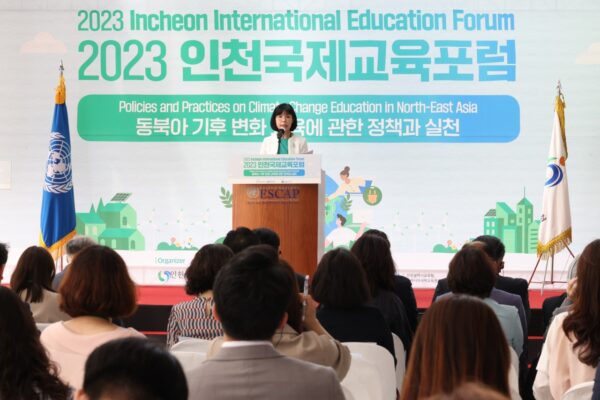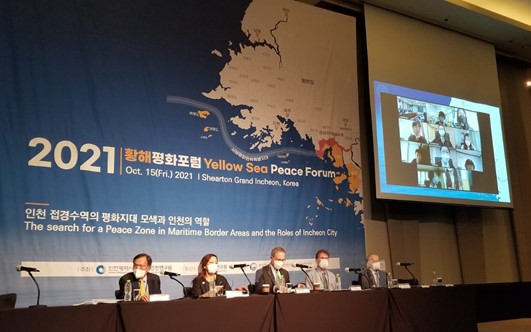-
2023 Incheon International Education Forum : Policies and Practices on Climate Change Education in North-East Asia
©UNESCAP As Climate Change is an emerging global issue in the past decade, its impacts cannot be addressed without the participation of all generations. In particular, young people will be mostly taking the risk and consequences of Climate Change for the longest duration. Therefore, it is crucial to provide high-quality climate change education by strengthening the capacity of educators and empowering youth in the efforts to tackle climate change. In light of this, the Incheon Metropolitan City Office of Education and the UN ESCAP Subregional Office for East and North-East Asia jointly organized the "2023 Incheon International Education Forum" on May 30-31, 2023, in Incheon, Republic of Korea. The forum centered around the theme of "Policies and Practices on Climate Change Education in North-East Asia." The forum aimed to promote the exchange of knowledge and experiences, focusing on climate change education (CCE) in the East and Northeast Asia region. It aimed to discuss how stakeholders can collaborate to provide effective climate education to the youth. Over 50 participants from the education sector, including school teachers and students, as well as international and local organizations, joined the forum, which consisted of six sessions. The forum began with an opening ceremony featuring remarks by Ms. Miyoung Lee, President of the Incheon East Asia Global Education Institute, Mr. Ganbold Baasanjav, Head of the East and North-East Asia Office, UNESCAP, and Mr. Chungsik Sin, Chairperson of the Education Committee, Incheon Metropolitan Council. Two keynote speeches were delivered by Mr. Seonghoon Do, Superintendent of the Incheon Metropolitan City Office of Education, and Mr. Henry Gonzalez, Executive Director a.i. of the Green Climate Fund. The first session, titled "Policies on Climate Change Education," focused on researchers from China, Japan, Mongolia, and South Korea sharing the current status of Climate Change Education in their respective countries. In the second session, titled "Student-friendly Climate Curriculum and Programs," presenters from China, Mongolia, and South Korea emphasized the importance of developing curricula on climate change-related subjects. They discussed the situation of CCE programs in schools from the perspectives of NGOs and researchers, evaluating and sharing gaps in CCE. The last session of Day 1 was dedicated to "Capacity Building for Educators." Presenters from WWF-China, UNESCO (ACCU), and the Incheon Metropolitan City Office of Education shared their programs aimed at equipping and training educators on CCE. They also discussed strategies for building collaboration and networks for CCE or environmental education in the region. On Day 2, the fourth session, titled "Climate Education Activities at a City and/or Community Level," commenced with a series of five presentations highlighting educational activities for young people both inside and outside of school. The speakers represented diverse backgrounds, ranging from NGOs like the Climate Change Center and Youth Origin Education in China to local schools in Japan and South Korea. Ms. Vivian Fu, Senior Communication Officer of the EAAFP Secretariat, also shared insights on linking Climate Change Education (CCE) to wetlands and advocated for leveraging existing educational facilities at these sites to enhance CCE. Vivian Fu, Senior Communication Officer of the EAAFP Secretariat, presenting about the links of conservation of wetland and migratory waterbirds with Climate Change Education (CCE) ©UNESCAP Session 5 focused on Global Developments in Climate Change Education, featuring panelists such as Ms. Won Jung Byun from UNESCO Headquarters, Mr. George Zedginidze, Head of Knowledge Management at the Green Climate Fund, Mr. Mozaharul Alam, Regional Coordinator for Climate Action at UNEP Asia and the Pacific Office, and Ms. Elly Herliani from the Southeast Asian Ministers of Education Organization. They discussed ways and mechanisms through which their organizations could incorporate CCE activities and synergize strategies and resources. Following that, a special session titled "Voices of the Youth" was held, during which five students from middle and high schools in Incheon presented their activities, including studying birds and plants at wetlands and conducting awareness-raising activities at schools and local communities. All participants were deeply impressed by the work and enthusiasm demonstrated by these students. The students also actively participated in the final session, an interactive discussion on future (sub-)regional cooperation in climate change education, alongside all the participants. The presenter from NGO Youth Origin Education (left) and student presenters (right) ©UNESCAP For more information on the event and presentations, please visit: https://unescap.org/events/2023/2023-incheon-international-education-forum-policies-and-practices-climate-change
Continue reading -
2021 Yellow Sea Peace Forum: The search for a Peace Zone in Maritime Border Areas and the Roles of Incheon City, Ro Korea
© Incheon institute The 2021 Yellow Sea Peace Forum was held on October 15th, 2021 in Songdo,…
Continue reading



